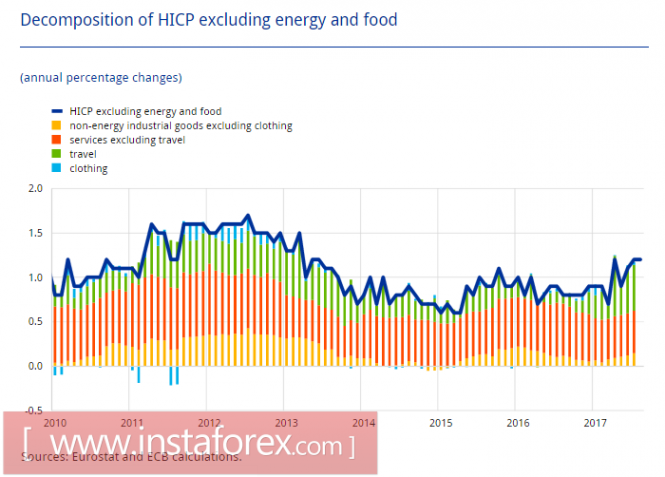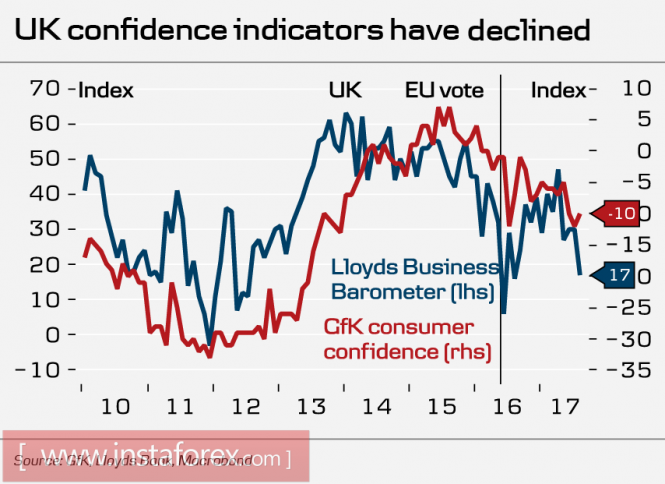Eurozone
On Monday, a group of IFO indicators will be published. Taking into account the fact that the ZEW showed steady growth earlier, it can be expected that the IFO indices will eventually show growth for the month of August.
On Thursday, Gfk's Consumer Confidence Index for the month of October and a group of indicators gauging the state of the euro-zone economy from the European Commission will be released. Forecasts for them are also optimistic. The main event of the week is the publication of inflation data on Friday. Experts expect a slight increase in overall inflation but the base will be slowing down. The main reason for this is the growth of the euro in recent months.

On Sunday, federal elections will be held in Germany. The growth of political risks will contribute to the weakening of the euro with the probability of correction to 1.16 being high.
United Kingdom
The key event of the past week is the program speech of Prime Minister Theresa May which was entirely devoted to the relationship between Great Britain and the European Union. May detailed her position on the transition period, her financial obligations, and the rights of EU citizens. However, she avoided any specifics about the trade. On one hand, May criticized the agreements between the EU. On the other, she spoke about agreements with Norway and Canada, stating that the existing nature of the relationship would allow the parties to conclude something completely new.
Obviously, the issue of trade at the moment is the key driver, since it directly affects financial stability and will be the basis of investment activity. It is important to recall that the decision about Brexit was taken in the UK at the highest level, at a time when Europe was subjected to a massive and some directed influx of migrants. The UK intended to regulate relations with the EU in its favor, limiting the influx of migrants to its territory, but opening the door to capital. This could begin the exodus from the problem areas, while retaining all trade preferences. The EU, of course, quickly understood this plan and linked all the controversial issues into a single package, which is the main reason for the complete lack of progress in the negotiations.
On Monday, the fourth round of negotiations will begin. In addition, the conference of trade unions of Great Britain will begin on Sunday. Politics goes into the expectations of the pound to the fore, which is especially noticeable against the backdrop of a calm week in terms of macroeconomic publications. The two most important releases, Gfk's consumer confidence index and Lloyds Business Barometer, will be released on Thursday and Friday. Both have negative dynamics and indicate that growth in the UK will be weak in the near future.

The tightening of the Bank of England's positions and a number of previously published macroeconomic data contributed to a sharp increase in the pound. This week, bulls can try to achieve success. First of all, for the concerns crosses of EUR/GBP, you can expect a decrease to 0.8690 and further, as well as crosses against the franc and the yen. At the same time, the GBP/USD rate will be more oriented towards news from the US, in the expectation of a return to the growth of the dollar. In this case, the trade will be lower than the maximum formed on September 20.
Oil
A number of positive factors contribute to the growth of speculative demand. Brent was fixed above $ 56/bbl and does not intend to stop. By the end of March, Nigeria, which was previously exempt from restrictions, may join the OPEC + countries. The observance of all agreements by the parties to the agreement indicates that the OPEC + countries have understood all the benefits from managing the production volume to controlling the price rate. Therefore, the prospects for the agreement are quite positive.
The material has been provided by InstaForex Company - www.instaforex.com